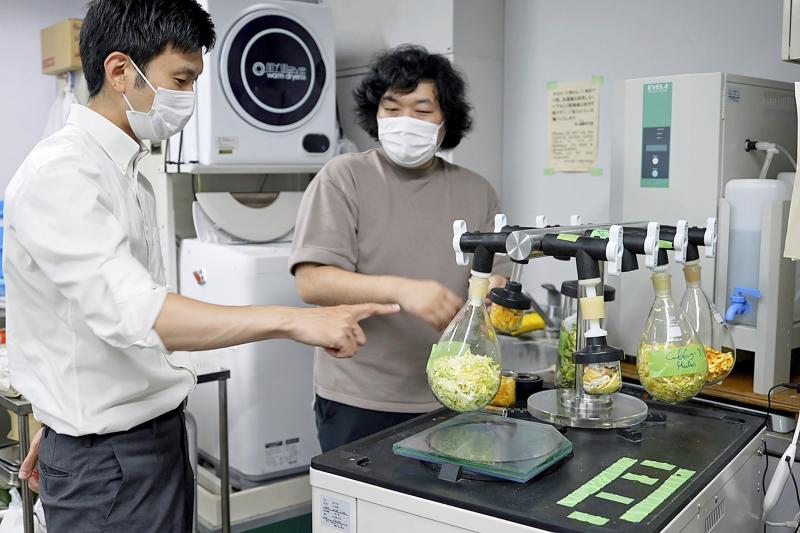Ever dreamed of having a gingerbread house like Hansel and Gretel’s? In the near future, edible houses might no longer just be found in fairy tales.
Tokyo University researchers Kota Machida and Yuya Sakai have developed a technology to transform food waste into potentially edible “cement” for construction use.
It is the world’s first process for making cement entirely from food waste.

Photo: AP
The tensile, or bending, strength of their product is nearly quadruple that of ordinary concrete, the researchers said.
Machida and Sakai said they hope to help reduce global warming, alleviating problems related to the methane that food waste emits in landfills.
Sakai, an industrial science professor, developed the technology while researching sustainable materials that could replace cement-based concrete.
Cement production accounts for 8 percent of the world’s carbon dioxide emissions, think tank Chatham House has said.
Sakai first developed a way to make concrete by subjecting pulverized wood particles to heat compression. The three-step process of drying, pulverization and compression was done using simple mixers and compressors that are commercially available.
With his student Machida, Sakai did the same thing with food waste. Previous trials using food waste to make cement required plastics to be mixed in to get the materials to stick together.
After months of failures, they realized they could get the cement to bind by adjusting the temperature and pressure used.
“The most challenging part was that each type of food waste requires different temperatures and pressure levels,” Sakai said.
Other experiments in using food waste in construction have mainly focused on using stuff such as coffee grounds or biowaste ashes as filler in regular concrete.
Sakai and Machida said they have successfully made cement using tea leaves, orange and onion peels, coffee grounds, Chinese cabbage and even lunchbox leftovers.
They have adjusted flavors with different spices and found that the colors, scent and taste of the cement can be quite appealing.
To be able to eat the material, a person would need to break it into pieces and boil it, Sakai said.
To make the cement waterproof and protect it from being eaten by rodents and other pests, it could be coated with a lacquer.
Food waste is a huge problem throughout the world. Japan produced about 5.7 million tonnes of edible food waste in 2019 and the government aims to reduce that to about 2.7 million tonnes by 2030.
Last year, Machida started a company called Fabula Inc with two of his childhood friends. They are working with other companies to make cups, cutlery and furniture out of food cement.
The process could be used to make edible makeshift housing for people following disasters, Sakai said.
“For example, if food cannot be delivered to evacuees, they could eat makeshift beds made out of food cement,” he said.
The food cement can be reused and is biodegradable, so it can be buried when it is no longer needed.
“Our ultimate hope is that this cement replaces plastic and cement products, which have worse environmental impacts,” Machida said.

Vincent Wei led fellow Singaporean farmers around an empty Malaysian plot, laying out plans for a greenhouse and rows of leafy vegetables. What he pitched was not just space for crops, but a lifeline for growers struggling to make ends meet in a city-state with high prices and little vacant land. The future agriculture hub is part of a joint special economic zone launched last year by the two neighbors, expected to cost US$123 million and produce 10,000 tonnes of fresh produce annually. It is attracting Singaporean farmers with promises of cheaper land, labor and energy just over the border.

US actor Matthew McConaughey has filed recordings of his image and voice with US patent authorities to protect them from unauthorized usage by artificial intelligence (AI) platforms, a representative said earlier this week. Several video clips and audio recordings were registered by the commercial arm of the Just Keep Livin’ Foundation, a non-profit created by the Oscar-winning actor and his wife, Camila, according to the US Patent and Trademark Office database. Many artists are increasingly concerned about the uncontrolled use of their image via generative AI since the rollout of ChatGPT and other AI-powered tools. Several US states have adopted

KEEPING UP: The acquisition of a cleanroom in Taiwan would enable Micron to increase production in a market where demand continues to outpace supply, a Micron official said Micron Technology Inc has signed a letter of intent to buy a fabrication site in Taiwan from Powerchip Semiconductor Manufacturing Corp (力積電) for US$1.8 billion to expand its production of memory chips. Micron would take control of the P5 site in Miaoli County’s Tongluo Township (銅鑼) and plans to ramp up DRAM production in phases after the transaction closes in the second quarter, the company said in a statement on Saturday. The acquisition includes an existing 12 inch fab cleanroom of 27,871m2 and would further position Micron to address growing global demand for memory solutions, the company said. Micron expects the transaction to

A proposed billionaires’ tax in California has ignited a political uproar in Silicon Valley, with tech titans threatening to leave the state while California Governor Gavin Newsom of the Democratic Party maneuvers to defeat a levy that he fears would lead to an exodus of wealth. A technology mecca, California has more billionaires than any other US state — a few hundred, by some estimates. About half its personal income tax revenue, a financial backbone in the nearly US$350 billion budget, comes from the top 1 percent of earners. A large healthcare union is attempting to place a proposal before